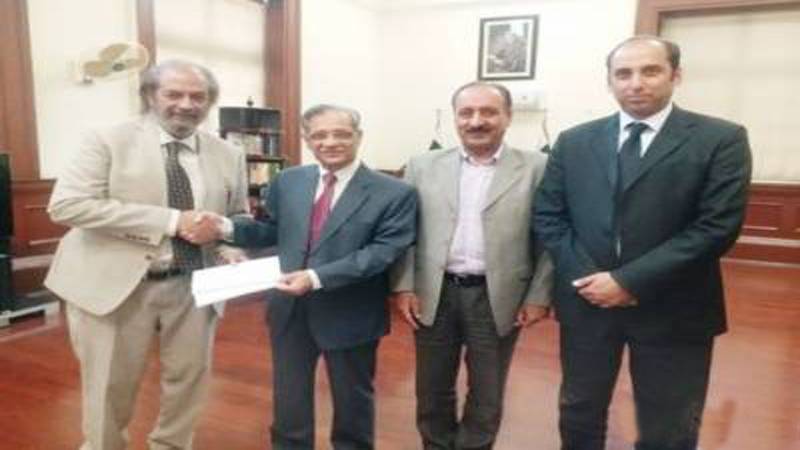
Charity is not a substitute for duty.
This is what comes first to our minds, when we see picture of the Government College University’s (GCU) Vice Chancellor hand a large cheque to the honorable Chief Justice for the dam fund.
I won’t dwell on contradictory expert opinions regarding the necessity of Diamer Bhash dam. I’ll assume that the dam is integral to our national strength, or even survival.
I wonder at times if ‘justice’ is a national interest. By August’s count, there are about 40,000 cases pending in the Supreme Court; a fraction of the total backlog of 1.8 million cases. The CJP often, and quite appropriately, criticizes dysfunctional Pakistani hospitals with overcrowded wards. But it’s not our doctors who are famous for handing out ‘tareekh’ instead of prescriptions.
One does not, and should not, draw attention to the failures of the justice system as a way of discrediting the Supreme Court’s fund-raising efforts for Diamer-Bhasha dam. It does, however, speak volumes of the sort of the system in which we live. There is no glory in honest, everyday labor. You may come to work on time every day, faithfully and efficiently performing your important duties and nobody would ever praise your name. That praise must be earned through other eye-catching forms of heroism.
Consider the other person in the picture. Professor Hassan Amir Shah donated a large sum of money, reportedly around 1.7 million, to Justice Saqib Nisar. Mr Shah is the Vice Chancellor of a university whose student body is already whimpering under the financial weight of his harsher new policies.
The Progressive Students Collective (PSC) deemed it an ‘unfortunate’ decision by GCU administration, pointing that this is the same institution that has imposed crippling fee hikes on its students. It further alleges that GCU’s teachers and visiting teachers are often forced to deal with massive delays in payment of salaries.
I’ve spoken to a number of students at GCU, who confirm that there has been significant rise in tuition and hostel fees. At the same time, a number of new policies have further increased the financial burden on GCU’s students.
Ali Sher, a student at GCU, explained in detail some of these financial challenges. In the past, students were able to easily submit application for late fees fines to be waived, under certain conditions. In recent weeks, this has become nearly impossible to do. New parking fee has been introduced. The university now charges fees for collection of degree forms as well. Fee reductions for exceptional academic performances are no longer being offered.
Concerning sexual harassment, Ali Sher alleges that GCU is yet to develop a proper harassment committee; complaining that such cases are managed inefficiently by investigators who are almost exclusively male. GCU has made news in the past because of sexual harassment, and speaking to some students on condition of anonymity, this is an ongoing issue being inadequately managed.
Even the most basic of necessities are often overlooked. Bathrooms appear to be in shambles. Ali Sher spoke bitterly of a ‘soap application’ that was submitted to the administration to ensure basic hygiene. The application took an embarrassing amount of time to be accepted, until which students had to bring their own soaps. At the same time, food quality appears to be in free fall at the cafeteria.
In the light of these shortcomings, it’s important to remind us of following: Dams are important, but charity always begins at home.
The cost of the establishment’s failure to balance the budget and prioritize its spending is being passed down to ordinary tax-payers. And it appears that our educational institutions are happy to sacrifice the needs of their distressed students and struggling teachers, in order to fund these mega-projects.
There is no glory in sitting dutifully behind a desk, handing our timely salaries, and resolving the long list of problems faced by the students. These are the everyday heroics that build our nation, and have a tendency to be taken for granted or ignored.
But everybody loves a philanthropist.
Everybody wants to be a hero. Nobody wants to do his actual job.
